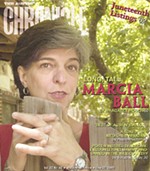'La Víctima': An old message still needing to be heard
As Teatro Vivo stages La Víctima, a groundbreaking look at Mexican-U.S. immigration, Rupert Reyes and Jorge Huerta discuss the play's origins and relevance
By Belinda Acosta, Fri., March 23, 2007

Rupert Reyes and Jorge Huerta met in 1974, when Reyes was a theatre major at UT-Austin and Huerta, who was just starting his academic career, was giving a talk on Chicano and U.S. Latino theatre and El Teatro de la Esperanza, a theatre group he helped found at UC-Santa Barbara. Today, Huerta is the foremost authority on Chicano theatre, and Teatro Esperanza is one of the principal companies that helped define Chicano theatre and an entire generation of theatre professionals. Reyes is one of them. His Teatro Vivo presents La Víctima, a groundbreaking production created by Teatro Esperanza that looks at Mexican-U.S. immigration from a historical yet intimate perspective of a mother and son. Huerta comes to Austin this weekend for PlaticArte, a one-day community symposium on immigration issues organized in conjunction with the production. The two came together by phone to discuss the play, the role of art in society, and how the present resembles the past. ![]()
Austin Chronicle: You two worked together at Esperanza?
Jorge Huerta: I left the company the year Rupert and his wife (Jo Ann Carreon-Reyes) came in, but I met them at UT. They sent the company and me a note saying how much our work inspired them. They were getting married soon and said they were going to ask their guests to make donations to Esperanza in lieu of wedding gifts. We were so touched.
Rupert Reyes: I was one of the first members of the professional company after many of the original members graduated from UC-Santa Barbara. I was hired [in 1978] specifically to perform La Víctima in Europe, then stayed with the company for three more years.
AC: La Víctima is 31 years old. Does it stand the test of time?
JH: Man's inhumanity to man is a universal issue. La Víctima starts during the mass deportations of the 1930s, an event that victimized families. Now, look at last year's marches. This issue of letting the Mexican in as a cheap source of labor when we need them and then kicking them out when we get scared of something else is not a new thing. In the Thirties, it was the [Great] Depression. Today, it's terrorism. Mexicans were accused of stealing jobs then, too.
AC: Have you done anything to update the play?
RR: The original starts in Spanish [because it's set in Mexico]. We realized that would not work with our audiences. And our mission is to bring bilingual works to the stage, so now the entire script is bilingual. We have a full sound design, music, set, and film added to complement and to tell their own story.
AC: Creative work and especially agitprop theatre is often criticized in this country for being a lesser form of art. First of all, do you consider La Víctima a political play? If so, how would – or does – La Víctima avoid this criticism?
JH: La Víctima is unabashedly political. [Chicano theatre] has never been afraid of politics. But Aristophanes was political. Shakespeare was political. Being political is not just left-wing. Ann Coulter is political.
RR: "Political theatre" is [often] used to belittle a production because you are right about agitprop theatre. Sometimes, it is the quality of the art. Too many times, theatre artists themselves believe that the message is all that is needed. If you have bad acting, poor writing, or cheap production values, then the audience escapes. They can say, "The play sucked," and they don't come back, and worse, they don't have to think about the message.
Teatro Vivo presents La Víctima March 22-April 1 at the Off Center, 2311 Hidalgo. For more information, call 474-8497, or visit www.teatrovivo.org.
PlaticArte, a community conversation on immigration with Dr. Jorge Huerta, other speakers, and selected scenes and music from La Víctima, will take place Saturday, March 24, 8:30am-4:30pm, at the Austin Community College Riverside Campus, 1020 Grove Bldg. G. For more information, call 413-6791, or visit www.teatrovivo.org.









